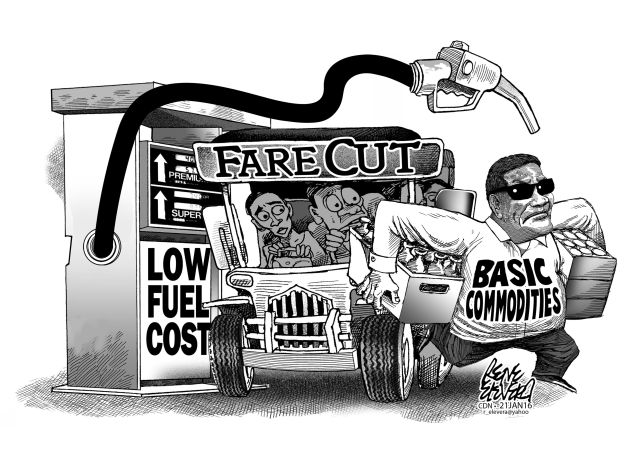There are at least two ways to look at the transport sector’s move to lobby for a fare cut before the Land Transportation Franchising Regulatory Board (LTFRB).
For one, the transport sector has finally acknowledged the obvious reality that fuel prices have gone down – to a low of US$28 dollars for a barrel of oil – and reducing the fare would not hurt their operations but, in fact, benefit the riding public who are their source of livelihood after all.
The second, and quite as obvious, view is the fact that continually opposing a fare cut would antagonize the riding public who would then demand alternative forms of public transport that may cost a little more but offer more convenience and value for their shrinking buck.
A fare cut of 50 centavos may not be enough — the prevailing rate is P7.00 for passenger jeepneys — but it could help lure more passengers into riding public utility jeepneys if only to help cut down on their expenses. Besides, how many public utility jeepney (PUJ) drivers do you know would bother to give a 50-centavo change to every passenger?
To them it’s a minor annoyance that could lead to arguments with passengers vigilant enough to collect their 50-centavo change. But just like those drivers, a lot of passengers don’t want the hassle of arguing with drivers for their change. And considering the reports of PUJ drivers who get angry enough that they would pick a fight with their passengers, is it worth the inconvenience to them?
If anything, the 50-centavo fare cut being lobbied by some transport groups was a belated move meant to win over the riding public, not a few of whom had resigned themselves to the previous reluctance of said groups for a fare cut despite a petition filed by a former congressman before the LTFRB last year.
Also belated was the Department of Trade and Industry (DTI) support for a reduction in the prices of basic and even prime commodities after almost a year of falling global oil prices. The agency could have pushed for it earlier but likely because of their immediate acceptance of the business community’s explanations that they are losing, it decided to put it off until now.
It would be the height of stupidity and sheer greed if government, the business community and transport sector continue to ignore these developments and impose the same high prices on the consumers.
Despite all this, they got the message however late in the day and they are willing to make amends. Better late than never then.
Disclaimer: The comments uploaded on this site do not necessarily represent or reflect the views of management and owner of Cebudailynews. We reserve the right to exclude comments that we deem to be inconsistent with our editorial standards.

